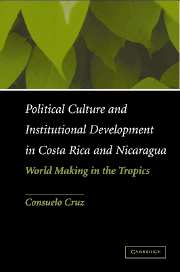 Political Culture and Institutional Development in Costa Rica and Nicaragua
Political Culture and Institutional Development in Costa Rica and Nicaragua Book contents
- Frontmatter
- Contents
- Acknowledgments
- List of Abbreviations
- Chronology
- Political Culture and Institutional Development in Costa Rica and Nicaragua
- Introduction
- 1 Theoretical Overview
- 2 Manichean Identities and Normative Scheming: Origins
- 3 Orphans of Empire: Constructing National Identities
- 4 Postcolonial Paths: Rhetorical Strategies and Frames
- 5 Costa Rica: Possibility Mongers
- 6 Nicaragua: Hybrid Arbitration
- 7 Tropical Histories: Paradise and Hell on Earth
- 8 Transition: Familiar Novelties
- Conclusion
- Index
8 - Transition: Familiar Novelties
Published online by Cambridge University Press: 20 August 2009
- Frontmatter
- Contents
- Acknowledgments
- List of Abbreviations
- Chronology
- Political Culture and Institutional Development in Costa Rica and Nicaragua
- Introduction
- 1 Theoretical Overview
- 2 Manichean Identities and Normative Scheming: Origins
- 3 Orphans of Empire: Constructing National Identities
- 4 Postcolonial Paths: Rhetorical Strategies and Frames
- 5 Costa Rica: Possibility Mongers
- 6 Nicaragua: Hybrid Arbitration
- 7 Tropical Histories: Paradise and Hell on Earth
- 8 Transition: Familiar Novelties
- Conclusion
- Index
Summary
The tradition of all the dead generations weighs like a nightmare on the brain of the living.
–Karl MarxHad Marx been born in Costa Rica, tradition probably would have been more like a placid dream. Had he been born in Nicaragua, it would have been a nightmare indeed. Of course, had he been presented with these options, he probably would have preferred not to be born at all. In any case, the central point remains: Because our perception of tradition varies across time and place, so does the relationship between legacies and agency. This holds most clearly when political actors are confronted with a tumultuous play of normative dictates and shifting interests. At such moments, we have seen, leaders seek to create and convey compelling reasons that enable and perhaps even embolden them and others to make difficult choices.
By the close of the 1980s, Nicaraguans found themselves at just such a juncture. Political elites shared both a long-standing Manichean historiography – with its concomitant injunctions – and an immediate interest in ending the armed conflict between the FSLN regime and the National Resistance Movement (Contra). This common interest stemmed from a combination of factors: the end of the Cold War, the country's economic devastation and social exhaustion, and a number of foreign governments pressing the relevant domestic actors for pacification.
- Type
- Chapter
- Information
- Political Culture and Institutional Development in Costa Rica and NicaraguaWorld Making in the Tropics, pp. 236 - 262Publisher: Cambridge University PressPrint publication year: 2005
